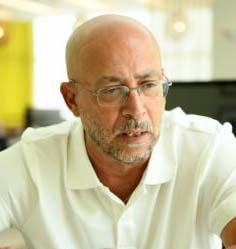PORT OF SPAIN, Trinidad, CMC – Cricket West Indies president (CWI) Ricky Skerritt, says he was hurt by the Caribbean side’s performance at the ICC World Cup in England but has contended it was “unrealistic” to expect them to win the showpiece, especially since very little strategic planning had been undertaken in the years preceding.
Pointing to an erratic selection policy that saw a constant turn-over of players, a losing culture which left the squad without a series win in five years and a world-ranking of number nine, Skerritt said while he had hoped for an “above par performance”, it would have always been difficult for West Indies to suddenly catapult themselves into the top tier of a global tournament.
However, the former St Kitts and Nevis cabinet minister, who toppled three-term incumbent Dave Cameron for the top CWI post only three months ago, said CWI would waste little time in rolling out a strategic plan aimed at building a quality side to compete for the 2023 World Cup scheduled for India.
“The good work by Dr [Kishore] Shallow (CWI vice-president) and myself and others has begun – it began just on the cusp of the World Cup but none of it was geared towards realistically expecting West Indies to win the World Cup,” Skerritt told i95.5FM sports programme here Thursday.
“We expect to win the 2023 World Cup and that’s the work that we’ve started now. I think the team did the best under the circumstances. They had some difficulties and there were at least three games that they could’ve won and maybe if the South Africa one hadn’t been rained out, anything was possible but this was not a team that had been in the business of winning and had been prepared for winning a World Cup.
“This was a team that was strung together by so many mixes and matches, and so many changes and tops and turns, and ups and downs over the last five, six years. It was just not possible for that team to go to England and win a World Cup.
“We were hoping as West Indians … and we’re tired of losing – that goes without any further discussion – but we will continue to lose unless we have a plan and implement a plan that has us better prepared for winning.”
There were high hopes for West Indies especially after they trounced Pakistan in their opening match at Nottingham but they quickly faded with six defeats in their next seven matches.
Thursday’s 23-run victory over Afghanistan at Leeds saw them finish the tournament with just two wins and five points, good enough for ninth in the 10-team standings and representing their worst-ever performance at a World Cup.
“Any loss for a West Indies team is a heartfelt loss for me … and thousands of fans but the reality is that West Indies cricket team has been at the bottom of the barrel for some time and we went into this tournament ranked at number nine in the ODI rankings, so anything that bordered on winning a significant amount of games would’ve been hopeful and perhaps not realistic,” Skerritt argued.
“I expected, at the very least, a par performance based on our rankings and based on what the team had been achieving over several years. However, I was really hoping for an above par performance and I think we generally did give an above-par performance and could’ve done much better if we had been able to get over the hump on a few occasions when we were very close [to winning].
“As you know, we beat Pakistan – ranked number six in the world – who we haven’t beaten for many years and we threatened Australia, New Zealand and Sri Lanka, all of whom rank above us. That indicated hopeful above-par performances and we showed that we’re close. We have a lot of work to do but we’re moving upwards.”
He added: “I’m not accepting mediocrity – that’s why I’m in this job. That’s why I campaigned and competed against the status quo but you have to understand you reap what you sow. And you don’t suddenly go from number nine ranking to a number three or four ranking in the space of a few weeks of an international global high-quality tournament like that. It just does not happen.
“You get upsets – you have competitions where you have lower-ranked participants upset higher-ranked and we did it with Pakistan.”
Skerritt pointed out that the high-performing teams in the World Cup were those who had been planning strategically since the end of the last tournament in 2015, and stressed the Windies needed to follow suit.
“We’ve not developed players to create a safety net of alternatives of the highest quality, we’ve not prepared for tournaments like World Cups well in advance, we’ve been chopping and changing and turning and twisting,” he contended.
“And just getting two or three new players into a squad weeks before you go on a tour doesn’t suddenly make you the best team in the world. You have to get that team together, playing together for over a period of two years or more.
“If you look at how India built their team, if you were following how the rest of the world does it, you would understand what we say when we say that we’re going to do it different. Within the next few weeks, a whole programme will start towards the next World Cup in 2023 and if things go according to plan, by 2021 you will begin to see the team shaping and you will have a pretty good idea.”
He added: “So the whole building of a team and making a team ready to perform at the highest standard is something that takes a little more science and a little more time than just changing selectors.”






